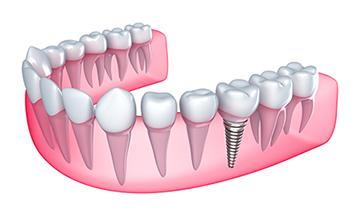You may have heard that dental implants are the ideal replacement for missing teeth--but you might not be sure exactly what's involved and how they work. Below is an overview of what's involved in getting dental implants, and what it means for your long-term dental health.
What Are Dental Implants?
Dental implants are small titanium posts that are surgically placed in your jawbone to replace missing tooth roots. After they're in place, implants become the foundation for crowns or dentures that restore the natural appearance of your teeth.
Receiving Your Implants
The first step to receiving dental implants is scheduling your initial exam so your dentist can formulate a treatment plan. Your overall physical and dental health will be evaluated to determine whether dental implant surgery is safe for you.
If you decide that dental implants are the best course of action, the next step is to come into the office to have the implants placed into your jaw. It may sound like a scary procedure, but it’s actually fairly simple and quick. Most patients require only local anesthesia and experience minimal pain afterward.
Although you should feel just fine returning to your daily activities within a day or two, it takes several months for your mouth to heal fully from the procedure. After the healing is complete, you’ll return to the office to receive your new dentures or permanent crowns.
How Dental Implants Support Your Bone Health
Whenever a tooth is missing, the bone tissue in the jaw begins to break down. Over time, this bone loss leads to a collapsed appearance in the lower face and an increased risk of damage to your remaining teeth.
Implants are the only way to replace a missing tooth root and maintain the strong bony foundation in your jaw. This protects your facial structure and keeps your remaining teeth healthy and strong.
Caring for Dental Implants
As long as you maintain a good oral hygiene routine, implants are likely to last the rest of your life. The implants themselves are meant to be permanent--once they fuse with your jawbone, they shouldn't require any further care beyond keeping your mouth and gums generally healthy.
However, the cosmetic portion of your restoration will require regular maintenance as prescribed by your dentist. The crowns, dentures, or bridges covering your implants may need to be adjusted or replaced occasionally.
Lexington Dental Implants
Our experienced and caring dentists serve the Lexington area with a full range of cosmetic and general dentistry services. To talk with one of our dentists about whether dental implants are the right treatment for you, request your appointment or call (831) 757-1038 today.
